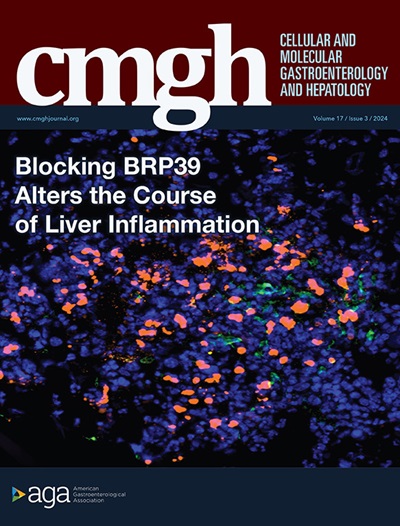Rethinking Immune Check Point Inhibitors Use in Liver Transplantation: Implications and Resistance
IF 7.1
1区 医学
Q1 GASTROENTEROLOGY & HEPATOLOGY
Cellular and Molecular Gastroenterology and Hepatology
Pub Date : 2024-09-24
DOI:10.1016/j.jcmgh.2024.101407
引用次数: 0
Abstract
Immune checkpoint inhibitors (ICIs) have revolutionized cancer therapy, including the two most common liver tumors, hepatocellular carcinoma and cholangiocarcinoma, but their use in the peri-transplantation period is controversial. ICI therapy aims to heighten cytotoxic T lymphocytes response against tumors. However, tumor recurrence is common owing to tumor immune response escape involving ablation of CTL response by interfering with antigen presentation, triggering CLT apoptosis and inducing epigenetic changes that promote ICI therapy resistance. ICI can also affect tissue resident memory T cell population, impact tolerance in the post-transplant period, and induce acute inflammation risking graft survival post-transplant. Their interaction with immunosuppression may be key in reducing tumor burden and may thus, require multimodal therapy to treat these tumors. This review summarizes ICI use in the liver transplantation period, their impact on tolerance and resistance, and new potential therapies for combination or sequential treatments for liver tumors.
反思肝移植中免疫检查点抑制剂的使用:影响与抗药性。
免疫检查点抑制剂(ICI)为包括肝细胞癌和胆管癌这两种最常见的肝脏肿瘤在内的癌症治疗带来了革命性的变化,但其在移植前后的应用还存在争议。ICI 疗法旨在增强细胞毒性 T 淋巴细胞对肿瘤的反应。然而,肿瘤复发很常见,原因是肿瘤免疫反应逃逸,包括通过干扰抗原递呈、引发细胞毒性 T 淋巴细胞凋亡和诱导表观遗传学变化来消减 CTL 反应,从而导致 ICI 治疗耐药。ICI 还会影响组织常驻记忆 T 细胞群,影响移植后的耐受性,并诱发急性炎症,危及移植后的存活。它们与免疫抑制的相互作用可能是减少肿瘤负荷的关键,因此可能需要多模式疗法来治疗这些肿瘤。本综述总结了 ICI 在肝移植期间的应用、其对耐受性和抗药性的影响以及联合或连续治疗肝脏肿瘤的潜在新疗法。
本文章由计算机程序翻译,如有差异,请以英文原文为准。
求助全文
约1分钟内获得全文
求助全文
来源期刊

Cellular and Molecular Gastroenterology and Hepatology
Medicine-Gastroenterology
CiteScore
13.00
自引率
2.80%
发文量
246
审稿时长
42 days
期刊介绍:
"Cell and Molecular Gastroenterology and Hepatology (CMGH)" is a journal dedicated to advancing the understanding of digestive biology through impactful research that spans the spectrum of normal gastrointestinal, hepatic, and pancreatic functions, as well as their pathologies. The journal's mission is to publish high-quality, hypothesis-driven studies that offer mechanistic novelty and are methodologically robust, covering a wide range of themes in gastroenterology, hepatology, and pancreatology.
CMGH reports on the latest scientific advances in cell biology, immunology, physiology, microbiology, genetics, and neurobiology related to gastrointestinal, hepatobiliary, and pancreatic health and disease. The research published in CMGH is designed to address significant questions in the field, utilizing a variety of experimental approaches, including in vitro models, patient-derived tissues or cells, and animal models. This multifaceted approach enables the journal to contribute to both fundamental discoveries and their translation into clinical applications, ultimately aiming to improve patient care and treatment outcomes in digestive health.
 求助内容:
求助内容: 应助结果提醒方式:
应助结果提醒方式:


